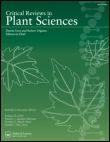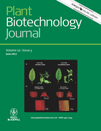
CRITICAL REVIEWS IN PLANT SCIENCES
metrics 2024
Elevating research through critical insights.
Introduction
CRITICAL REVIEWS IN PLANT SCIENCES, published by Taylor & Francis Inc, is a prestigious journal that has been advancing the field of plant science since its inception in 1983. With an impressive impact factor and consistently ranked in the top quartile (Q1) of its category, this journal is a leading platform for the dissemination of peer-reviewed research that spans the breadth of plant biology, ecology, and agricultural applications. Housed in the United Kingdom, it serves an international readership, making significant contributions to our understanding of plant systems and their environmental interactions. This journal is highly regarded within the Scopus rankings, holding an impressive position of 18 out of 516 journals in the Agriculture and Biological Sciences category, placing it in the 96th percentile. Although not currently open access, the journal provides valuable insights and critical reviews that are essential for researchers, professionals, and students striving to further their knowledge and bolster their own research in plant sciences.
Metrics 2024
 1.58
1.58 6.00
6.00 8.00
8.00 138
138Metrics History
Rank 2024
Scopus
IF (Web Of Science)
JCI (Web Of Science)
Quartile History
Similar Journals

Annual Review of Plant Biology
Navigating the Landscape of Plant ResearchThe Annual Review of Plant Biology, published by Annual Reviews, stands as a premier academic journal dedicated to the comprehensive coverage of significant developments in the field of plant biology. With an impactful presence in the United States and a stellar reputation reflected in its Q1 rankings across multiple categories including Cell Biology, Molecular Biology, Physiology, and Plant Science, this journal consistently ranks among the top within its domain. The journal is particularly esteemed for its synthesis of the latest research findings, making it an invaluable resource for researchers, professionals, and students seeking in-depth insights and advancements in plant biology. Though it does not offer open access, the Annual Review of Plant Biology is essential for those committed to exploring the intricate mechanisms underlying plant function and development, with coverage spanning from 1996 to 2024. As the field continues to evolve, this journal will undoubtedly remain at the forefront, driving innovation and fostering a deeper understanding of plant sciences.

Journal of Integrative Plant Biology
Unveiling the Complexities of Plant LifeThe Journal of Integrative Plant Biology, published by WILEY, is a premier academic journal that has been at the forefront of advancing research in plant biology since its inception in 2005. With a notable impact factor and a robust Scopus ranking—positioned at #7 out of 516 in Plant Science and #18 out of 438 in Biochemistry—this journal is recognized as a Q1 journal in multiple categories, including Biochemistry and Plant Science. The journal aims to bridge the gaps between various disciplines in plant research, emphasizing integrative and interdisciplinary approaches to understanding plant biology. With options for open access, the Journal of Integrative Plant Biology ensures broad visibility and impact of research findings, making it an invaluable resource for researchers, professionals, and students looking to stay informed on innovative advancements in the field. Its headquarters are located in the United Kingdom, further amplifying its reach within the global academic community.

Molecular Horticulture
Advancing the Future of Crop Science and Molecular BiologyMolecular Horticulture is a prestigious journal published by SpringerNature, dedicated to advancing knowledge in the fields of Agronomy, Crop Science, Horticulture, and Molecular Biology. Based in the United Kingdom, this journal, with ISSN 2730-9401, is recognized for its high-quality, peer-reviewed research and has rapidly established itself within the academic community, achieving a remarkable Q1 ranking across its relevant categories as of 2023. With a strong focus on innovative research that explores the intersection of molecular biology and horticultural science, Molecular Horticulture provides valuable insights that are essential for researchers and professionals aiming to enhance crop production and sustainability practices. As part of the Scopus database, the journal ranks impressively within its fields, holding notable positions such as Rank #7 in Horticulture and Rank #42 in Agronomy and Crop Science. While currently published through traditional access models, the journal remains accessible to a wide audience of scientists, educators, and students eager to stay informed on the latest discoveries and trends in plant science.

Annual Plant Reviews Online
Advancing the Frontiers of Plant ScienceAnnual Plant Reviews Online, published by WILEY, serves as a premier academic resource dedicated to the evolving field of plant sciences, including specialties in agronomy, horticulture, and food science. With an impressive Q1 ranking in Horticulture and Q2 classifications in Agronomy, Crop Science, and Plant Science, this journal reflects a high standard of scholarly contribution, evidenced by its positioning in the 75th percentile range among agricultural and biological sciences in leading Scopus rankings. Aimed at researchers, professionals, and students alike, the journal covers a broad spectrum of plant-related topics and trends, aiming to enhance the understanding of plant biology and its applications. Offering timely insights and critical reviews, Annual Plant Reviews Online connects the global community with essential knowledge, supporting advancements in sustainable practices and innovations in agriculture. Researchers and students can access its content seamlessly, contributing to ongoing discussions in plant science and fostering academic growth.

Botanical Studies is a premier open-access journal published by Springer, dedicated to the field of botany and plant sciences. Since its establishment in 2006, the journal has championed innovative research and scholarship that explores diverse botanical topics ranging from plant systematics to ecology and conservation. With a commitment to broad accessibility, it promotes the dissemination of knowledge to researchers, professionals, and students worldwide. Botanical Studies fosters academic collaboration and dialogue, contributing significantly to the global botanical community. Its open-access policy allows unrestricted access to its high-quality, peer-reviewed content, ensuring that vital research is available to all. Join the growing community of scholars advancing botanical science through this essential publication, conveniently located at One New York Plaza, Suite 4600, New York, NY 10004, United States.

JOURNAL OF PLANT BIOLOGY
Unveiling Nature's Secrets, One Plant at a TimeJOURNAL OF PLANT BIOLOGY, published by SPRINGER HEIDELBERG, is a leading academic journal dedicated to advancing the field of plant science. With an impressive impact factor signifying its high citation rate and rigorous peer-review process, this journal ranks in the Q1 category within Plant Science, placing it among the top-tier periodicals in the discipline. Established in 1999, it has become an essential resource for researchers, professionals, and students seeking the latest findings and developments in plant biology. The journal fosters a collaborative environment for sharing innovative research, exploring ecological interactions, and understanding plant physiology, thereby contributing significantly to advancements in sustainable agriculture and environmental conservation. Its high Scopus ranking of 102 out of 516 in the category of Agricultural and Biological Sciences further underscores its relevance and impact within the scientific community. For those interested in cutting-edge research, JOURNAL OF PLANT BIOLOGY is a vital source of knowledge, offering insights that are crucial for the future of plant science.

Plant Gene
Advancing the Frontiers of Plant GeneticsPlant Gene is an esteemed academic journal dedicated to the comprehensive study of plant genetics, genomics, and biotechnology. Published by Elsevier, this journal operates from its base in the Netherlands and has made significant strides since its inception in 2015, with a converged year span extending until 2024. As an integral resource in the field, Plant Gene is categorized in the Q2 quartile for Plant Science and Q3 for Biochemistry, Biotechnology, and Genetics as per the 2023 evaluations, reflecting its growing influence and quality of research. With an impactful presence in Scopus rankings—positioned at #145 in Plant Science—this journal serves as a platform for presenting innovative findings and advancing knowledge in plant science. Researchers, professionals, and students will find access to cutting-edge research articles that not only drive the scientific community forward but also offer invaluable insights into the genetic mechanisms underpinning plant development and resilience. While the journal currently operates under a subscription-based model, it aims to broaden accessibility and foster a diverse range of scholarly discussions in the ever-evolving field of plant genetics.

Plant Science Today
Fostering breakthroughs in ecological and plant research.Plant Science Today is a prominent journal dedicated to advancing the field of plant sciences through innovative research and comprehensive reviews. Published by HORIZON E-PUBLISHING GROUP in India, this open-access journal has been actively disseminating knowledge since its inception in 2018, with a convergence period extending to 2024. With an ISSN of 2348-1900 and a growing reputation, it is categorized in various quartiles for 2023, notably achieving Q3 in Biochemistry, Genetics and Molecular Biology (miscellaneous), while it holds Q4 rankings in critical fields including Ecology and Plant Science. As a valuable resource for students, researchers, and professionals, Plant Science Today aims to inspire discussion and innovation in the realm of ecological and plant science disciplines, where it currently ranks within the lower percentiles in prominent categories such as Environmental Science and Agricultural and Biological Sciences. The journal serves as a crucial platform for the exploration of experimental and theoretical advances, fostering a community eager to explore plant biology's complexities.

JOURNAL OF PLANT RESEARCH
Cultivating Knowledge, Growing Innovation.JOURNAL OF PLANT RESEARCH, published by SPRINGER JAPAN KK, is a leading academic journal that has carved a niche in the field of Plant Science. With its ISSN 0918-9440 and E-ISSN 1618-0860, this journal has been disseminating high-quality research since its inception in 1993 and continues to be essential reading for academics and practitioners alike, aiming to bridge the gap between innovative plant research and practical applications. The journal is highly regarded, holding a prestigious Q1 ranking in Plant Science for 2023, and is positioned in the top 80th percentile within the Scopus rankings for Agricultural and Biological Sciences. The journal's coverage includes a wealth of topics pertinent to advancing our understanding of plant biology, ecology, and sustainable agricultural practices. Although it operates under a subscription model, its influence in the research community remains profound, making it a vital resource for contemporary studies in plant-related disciplines.

PLANT BIOTECHNOLOGY JOURNAL
Advancing sustainable solutions through plant innovation.Plant Biotechnology Journal, published by Wiley, is a premier open-access platform dedicated to advancing the field of plant biotechnology. Since its inception in 2003, this journal has played a pivotal role in disseminating high-quality research that enhances our understanding of plant genomics, biochemistry, and molecular biology. With an impressive impact factor and a prominent position in Q1 quartiles across Agronomy, Crop Science, Biotechnology, and Plant Science, it ranks among the top journals globally, reflecting its significant influence in the agricultural and biological sciences. Researchers and professionals can access cutting-edge studies and reviews that facilitate innovation in sustainable crop production and biotechnology applications. The journal's transition to an open access model since 2016 has further amplified its reach, ensuring that vital research is available to a global audience, promoting collaboration and knowledge sharing within the scientific community.